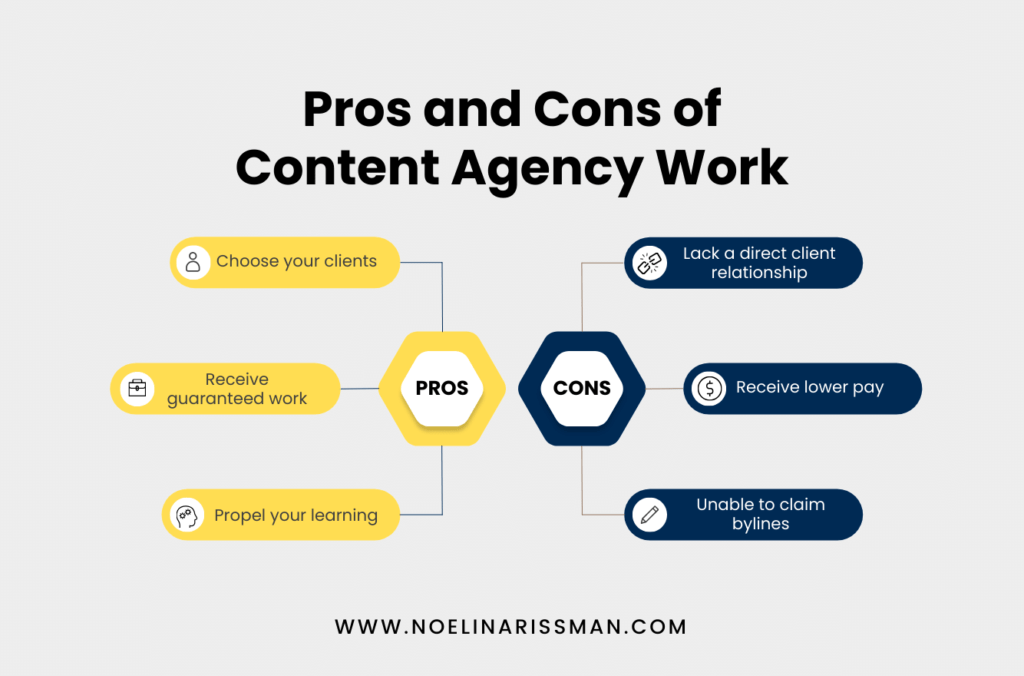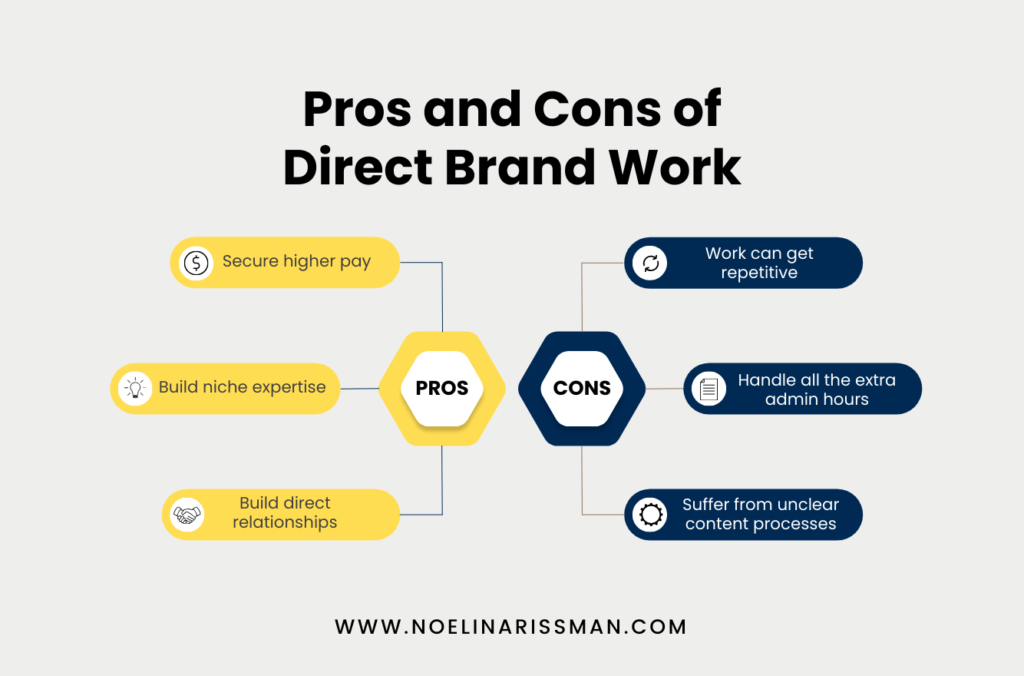Overview
- Agencies handle the entire client relationship (from acquisition to offboarding) and can ease you into the world of content writing as a business.
- With direct brands, not only can you secure higher pay, but you can also develop a better relationship, which can be leveraged later on.
- Whether you work with content agencies or direct brands boils down to preference. Neither is better than the other.
While there are thousands of clients to work with as a content writer, they all fall into two buckets: content agencies or direct brands. As a beginner writer, it’s normal to be confused about which one you should work with, especially as you’re considering career growth, pay, and your interests.
So, if you’re unsure about whether to work with content marketing agencies or direct brands as a freelance content writer, this post is for you. Let’s dive into pros and cons of both arrangements, based on my personal experience throughout the years.
Table of Contents
The 411 on content agencies
Also called content marketing agencies, content agencies are companies that handle content for a portfolio of clients within a certain industry.
An agency’s services can include content strategy, content writing, content marketing, social media, SEO, branding, email marketing, and a plethora of others, depending on the type of agency and capabilities of its team.
As a content writer, you’ll often be in charge of writing clear, concise, and compelling long-form content, social posts, and other content pieces.
Whether you work with content mills (i.e., agencies that pay pennies per word and value quantity over quality) or high-end content agencies, there are upsides and downsides to this type of client.

Pros of working with content agencies
Some of the biggest pluses to working with agencies deal with the ease of client communications and possibility of career growth as a newbie:
- Hand off the complexities of a client relationship. Agencies handle the entire client relationship: acquisition; onboarding; project management (think: meetings that could have been emails); legalities like contracts and payments; offboarding; and more. This means you, as a writer, can stick to what you do best: writing.
- Receive guaranteed work. Depending on the agency’s maturity and growth rate, they can also guarantee you a set amount of work each month. This is known as a retainer and is often the bread and butter of many freelance writers’ income.
- Choose your clients. Depending on the relationship you have with the agency founder or content head, you can often pick from a diversity of clients within the niche they serve. This is convenient for those who’ve yet to specialize and want to explore various industries.
- Propel your learning. Agencies have their documentation and systems already organized and running. You seamlessly form part of their team and receive access to all the documentation and tools you need to hit the ground running — SEO tools like Ahrefs, Semrush, or Clearscope; editorial and brand style guidelines; content briefs; writers’ guides; etc.
Cons of working with content agencies
But alas, not all that glitters is gold. For some, the downsides outweigh the upsides of agency work:
- Receive lower pay. Pay is often lower since they take their cut as the intermediaries. You can offset this by working with higher-end agencies. (I used to work with one that paid $0.50/word.)
- Unable to claim bylines. Also, there may be some gray areas regarding how to attribute work performed for them. Can you include pieces in your portfolio? And if you do, do you mention working with [insert: brand name] was via an agency? Could that discredit you as a freelancer?
- Lack a direct client relationship. Depending on the agency, you may be in direct contact with the client’s Content lead when writing and editing content. But that’s not normally the case, as agency coworkers are your main point of contact. This makes it more difficult to establish a long-lasting relationship with anyone on the client’s team.
The 411 on direct brands
This is when you work directly with a client in-house as their freelancer. Depending on the size of the company, you could work with their Content team (think: Content Marketing Manager, CMO, Content lead, etc.) or directly with the founder.
The key here is that there’s no longer the intermediary: the agency.

Pros of working with direct brands
Here are some of the best reasons to work directly with brands:
- Secure higher pay. Because you’re cutting out the middle people, you can often secure higher pay. Plus, it’s easier to raise rates when the time comes.
- Build niche expertise. A major pro of working directly with brands is building niche expertise and your skills. You can then leverage this niche content later in your portfolio when targeting similar brands.
- Build direct relationships. Developing a more direct relationship with the company can be used to your benefit later on (think: asking for a recommendation or references, leveraging their network, etc.). This can lead to long-term career security.
- Access performance metrics. When working directly with brands, you’re more likely to have access to performance metrics, like how much traffic or conversions your long-form blog brought in for the client. These results can then be used as proof of how well you do your job.
Cons of working with direct brands
Every rose has its thorn. Here are some to working with direct brands:
- Work gets repetitive. Working long-term with the same client can get boring, especially if it’s not a topic that interests you.
- Handling the entire client relationship can be draining. You manage the client relationship and all that entails. This includes regular 1:1s, ad hoc check-in calls, project management, invoicing, and more. Keep on top of baking those extra admin hours into your fees. (Keep in mind that if there’s a breach of contract, missed payments, etc., that’s also on you.)
- There may be unclear content processes. Some brands don’t have clear systems and processes for content creation and management (think: who’s the main point of contact for content edits? Too many cooks in the kitchen can lengthen the editing cycle.). If you don’t establish them, you could get caught in the middle, which eats up time.
My advice on whom to work with
Agencies often have a bad reputation, mainly due to the infamous content mills. As someone who kickstarted my B2B content career working for agencies, I recommend this approach before going in-house.
(Well-established) content agencies are a great entry point to freelance content writing. They can provide you steady work, help you build your portfolio, and ease you into direct client relations. You can also see behind-the-scenes on processes, systems, and documentation — like creating content strategies and briefs — and sometimes have access to ongoing learning opportunities and remote work perks.
Once you’ve built up your proof of work and feel more equipped (read: confident), you can pitch to direct brands to keep scaling. With time, this direct access to a brand can also support future efforts to pivot into complementary content areas, like strategy or distribution.
Long story short: Put your priorities in order, and go from there. The only right path forward is yours.
